Executive Decision Making Skills Training Course in Singapore
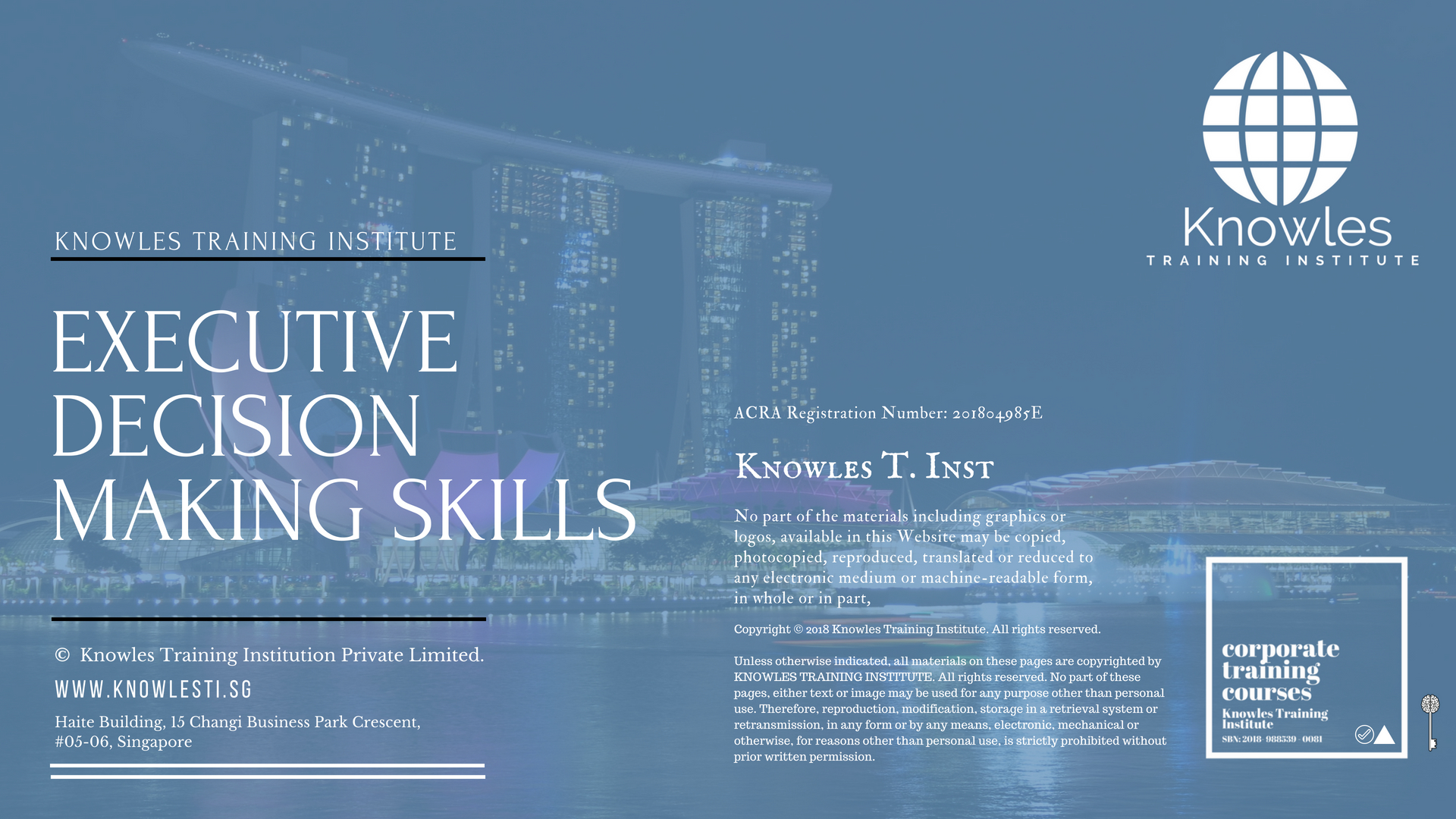
About This Executive Decision Making Skills Training Course
Executive Decision Making Skills Training Course in Singapore
Executives are business leaders whose employees look up to for guidance. At its core, their job mainly entails major decision-making and utilizing decision-making tools. Their honed experiences from climbing up the corporate ladder have made their judgments reliable. However, it is also equally important to trust those under them to arrive at satisfying conclusions.
Who Should Attend This Executive Decision Making Skills Training Workshop
This Executive Decision Making Skills Training workshop is ideal for anyone who would like to gain a strong grasp and improve their Executive Decision Making Skills.
All Staff Within An Organisation
Managers
Team Leaders
Executives
Assistants
Officers
Secretaries
Group Size For This Executive Decision Making Skills Training Program
The ideal group size for this Executive Decision Making Skills course is:
Minimum: 5 Participants
Maximum: 15 Participants
Course Duration For This Executive Decision Making Skills Course
The duration of this Executive Decision Making Skills training workshop is 2 full days. Knowles Training Institute will also be able to contextualised this workshop according to different durations; 3 full days, 1 day, half day, 90 minutes and 60 minutes.
2 Full Days
9 a.m to 5 p.m
Executive Decision Making Skills Course Benefits
Below is the list of course benefits of our Executive Decision Making Skills Training Course
- Apply executive decision making skills in the management of organizations in order to create good company impression.
- Incorporate executive decision making skills in partnership building to enhance business collaborations and partnerships.
- Gain knowledge on executive decisions making skills that impact on achieving and declaring business success.
- Apply effective executive decision making skills in business processes and systems to improve business strategies for development.
- Incorporate executive decision making in the day-to-day business activities will lead to efficient company resources management.
- Develop effective communication strategy to convey executive decisions to staff, customers and business partners.
- Incorporate executive decision making skills in business plans to ensure better coordination of business activities.
- Executive decision making skills on staff management will enable companies to improve the role of Human resource managers.
- Incorporate executive decision making in business processes and systems to develop effective business follow-up tactics.
- Improved ability to detect and resolve business challenges and problems in the early stages.
- Acquire knowledge to make executive decisions regarding opportunities for business growth.
- Executive decision making allows for enhanced operational research and data management.
- Apply executive decision making skills in business process to effectively manage risks in companies.
Executive Decision Making Skills Training Course Objectives
Below is the list of course objectives of our Executive Decision Making Skills Training course
- Understand the meaning and significance of executive decision making skills for corporate professionals.
- Appreciate the importance of effective executive decision making skills at the workplace.
- Understand the characteristics and qualities of a good decision maker and good decision making.
- Learn the stages of a decision making process at the corporate workplace.
- Understand the executive functions in the corporate business where executive decision making skills are required.
- Learn the executive decision making model/framework for corporate professionals.
- Learn the obstacles that hinder effective decision making for corporate managers and how to overcome these challenges.
- Know the process of identifying and structuring problems with a view to making the right decisions.
- Learn ways of acquiring executive decision making skills for corporate professionals.
- Appreciate the role of effective problem solving skills in executive decision making process.
- Learn the tools that aid corporate leaders in making executive decisions.
- Appreciate the role of analytical and critical thinking skills in executive decision making.
- Learn ways and methods of improving executive decision making skills for corporate professionals.
Course Content For This Executive Decision Making Skills Training Course
Below is the list of course content of our Executive Decision Making Skills training course
- Executive decision making is different from the day-to-day decision making and majorly involves making tough decisions regarding structures, changes and management of an organization.
- What is the meaning and significance of executive decision making skills?
- What is the importance of effective executive decision making skills at the workplace?
- What are the characteristics and qualities of a good decision maker and good decision making?
- What are the stages of a decision making process at the corporate workplace?
- What are the executive functions in the corporate business where executive decision making skills are required?
- What is the executive decision making model/framework for corporate professionals?
- What are the obstacles that hinder effective decision making for corporate managers?
- What is the process of identifying and structuring problems with a view to making the right decisions?
- In what ways can corporate professionals of acquiring executive decision making skills?
- What is the role of effective problem solving skills in executive decision making process?
- What are the tools that aid corporate leaders in making executive decisions?
- What is the role of analytical and critical thinking skills in executive decision making?
- In what ways and methods can corporate professionals improve executive decision making skills?
Executive Decision Making Skills Value Added Materials
Each participant will receive the following materials for the Executive Decision Making Skills course
Executive Decision Making Skills Learner’s Guide
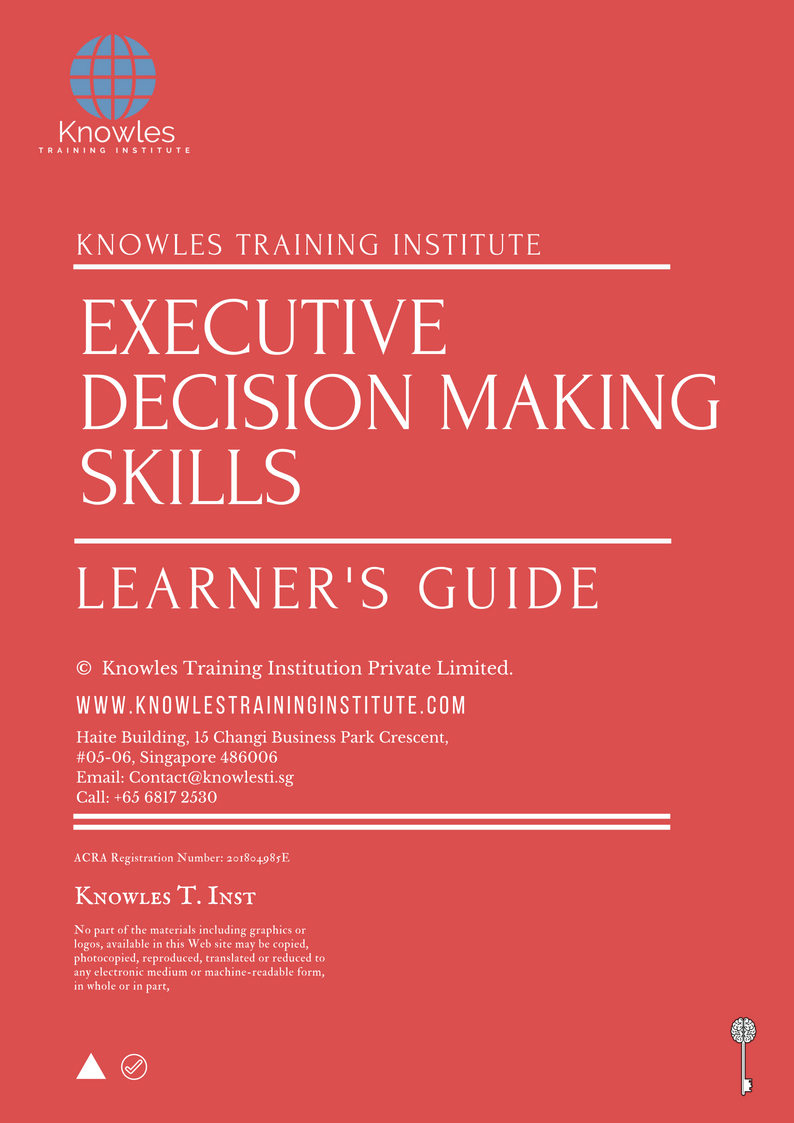
Executive Decision Making Skills Key Takeaways Notes
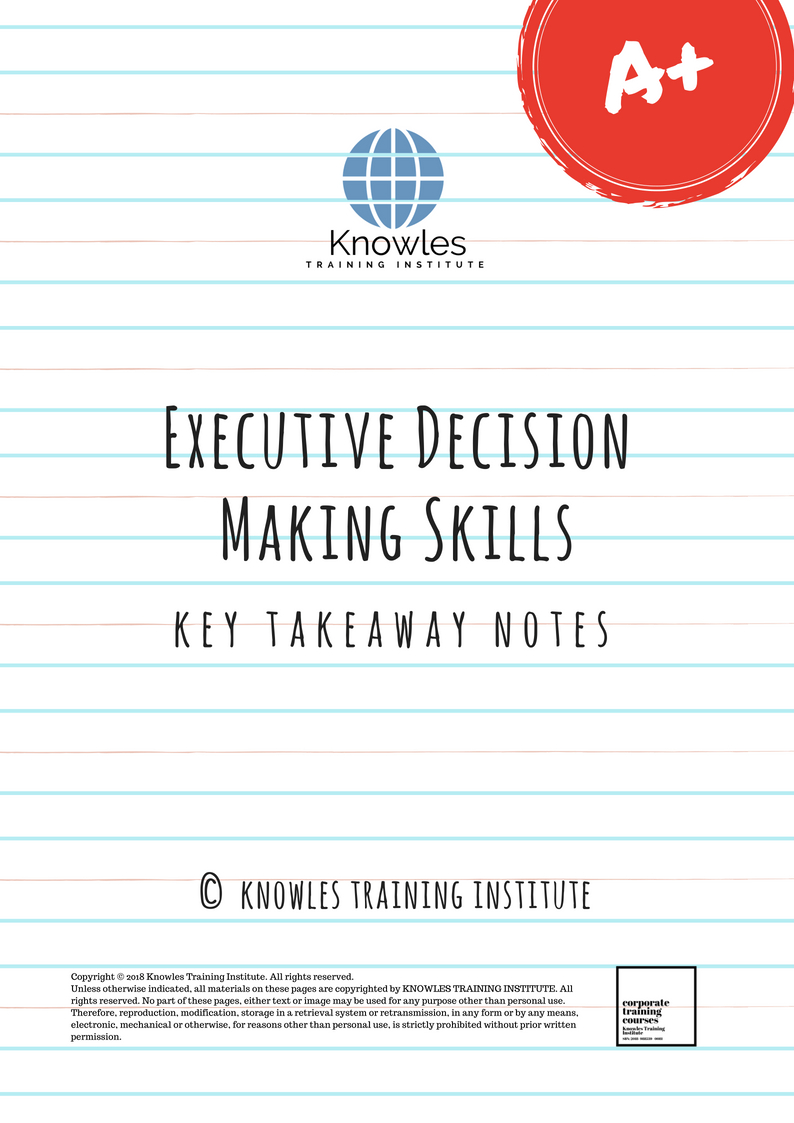
Executive Decision Making Skills Training Essentials Ebook
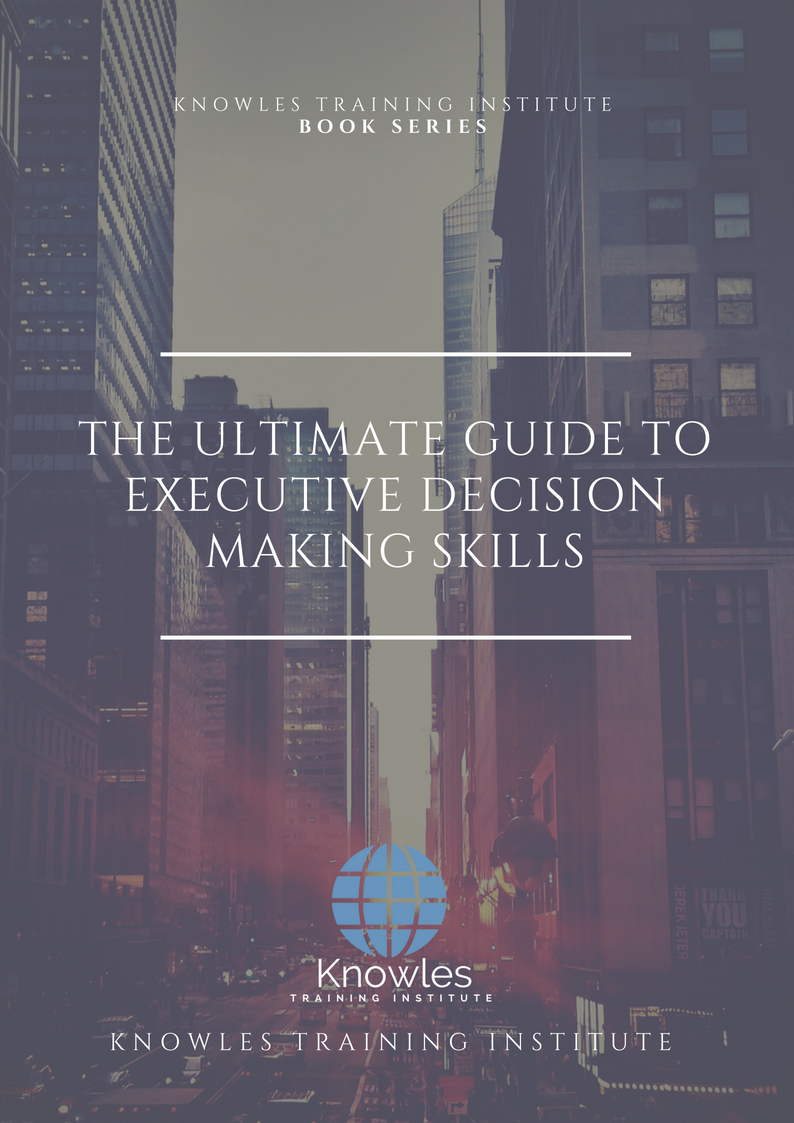
Executive Decision Making Skills Course Handouts
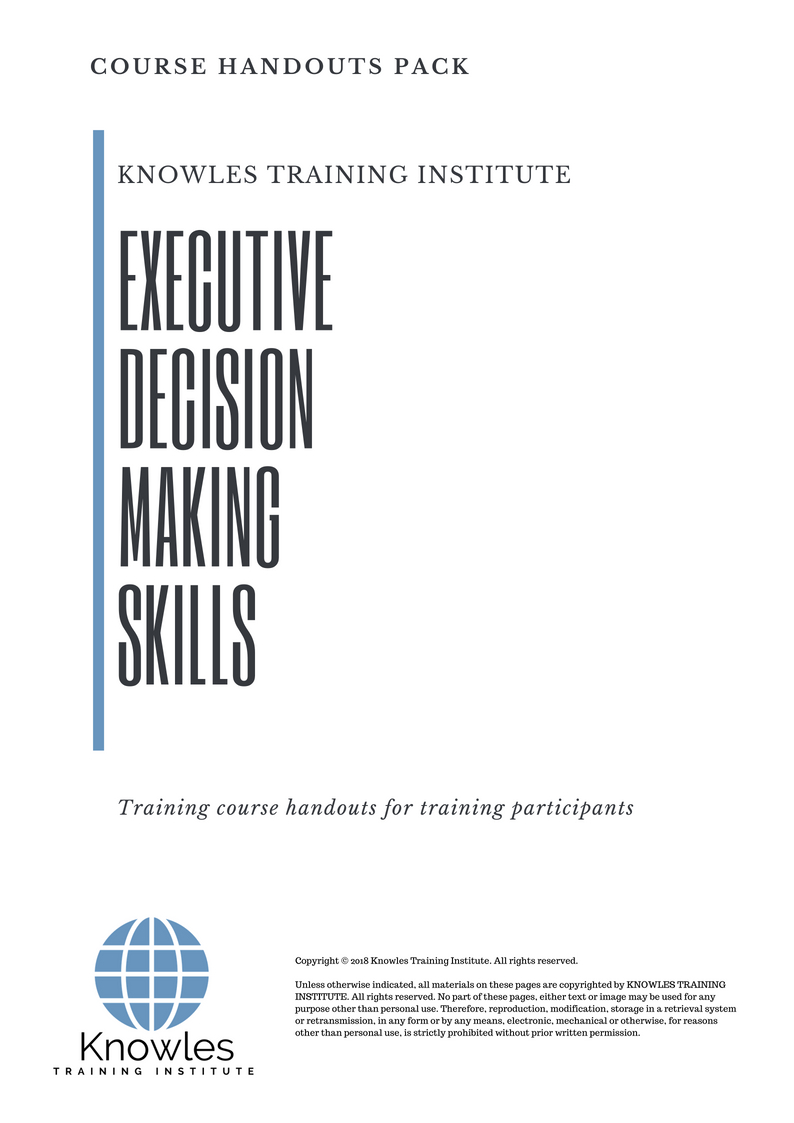
Executive Decision Making Skills 30-Day Action Plan
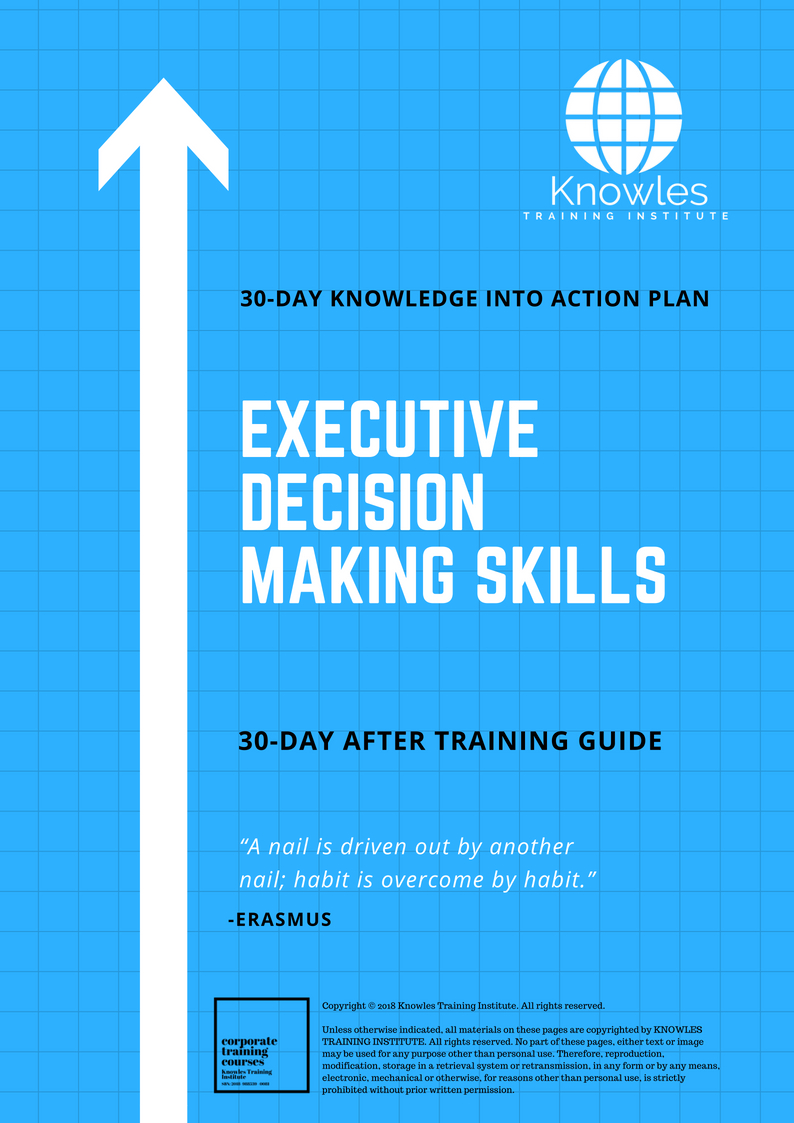
Executive Decision Making Skills MindMaps Pack
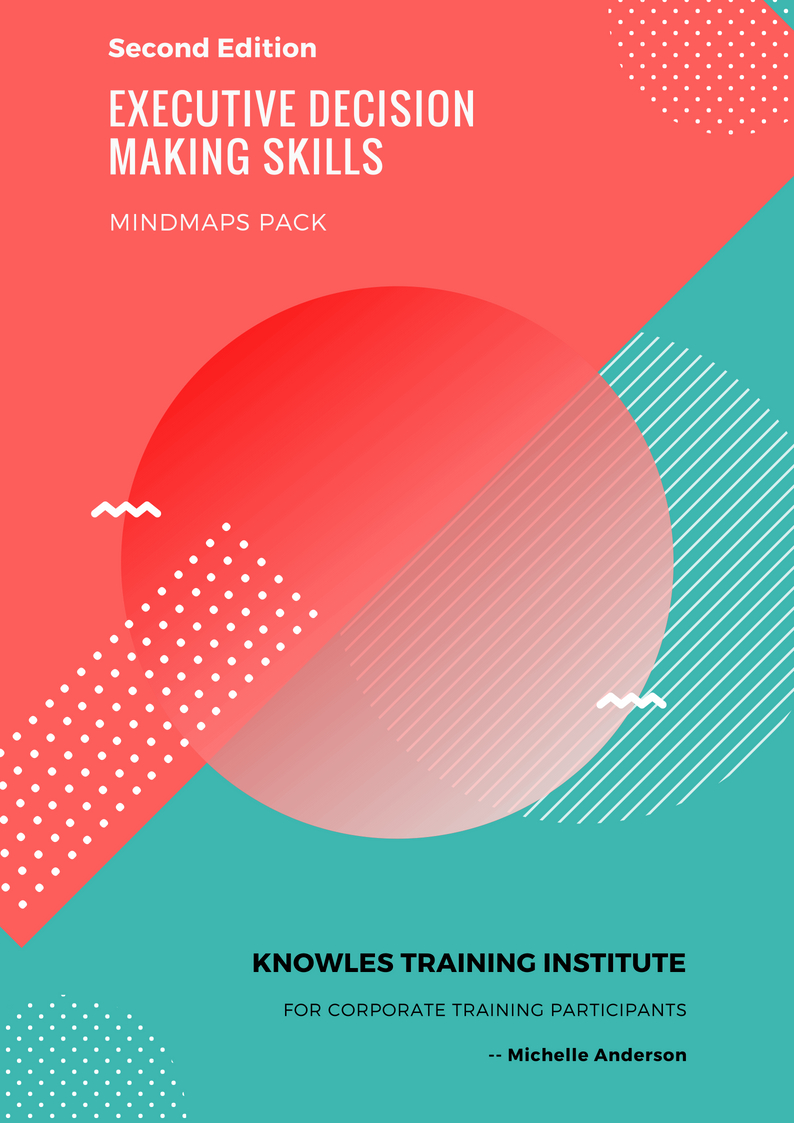
Executive Decision Making Skills PPT Slides Used During Course

Executive Decision Making Skills Long-Term Memory Flashcards Pack
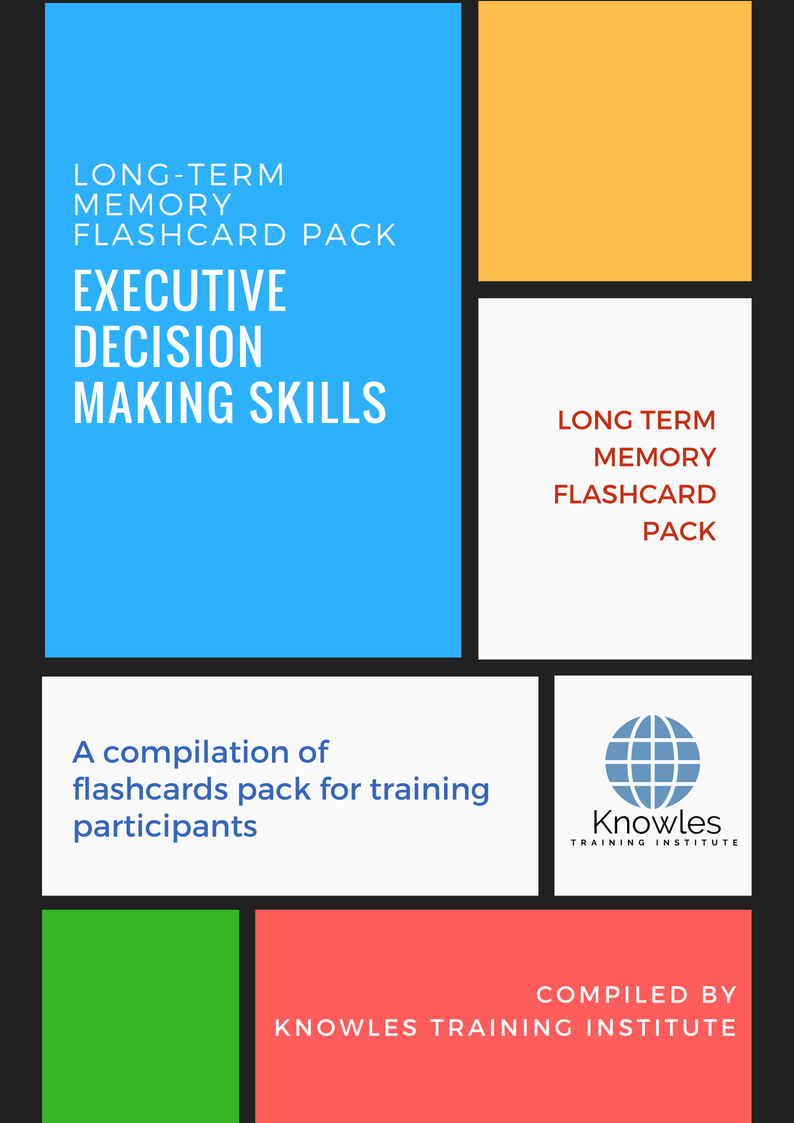
Executive Decision Making Skills E-Learning Course
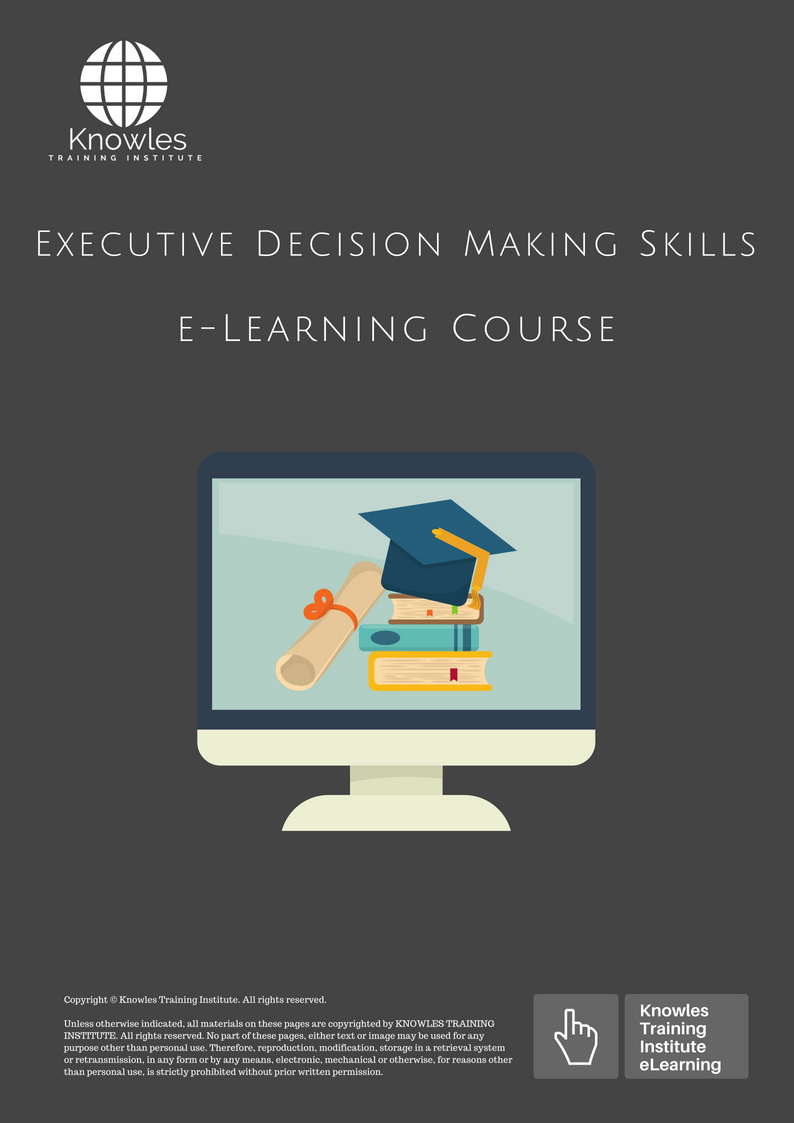
Executive Decision Making Skills Online Video Course

Executive Decision Making Skills Essentials Audiobook
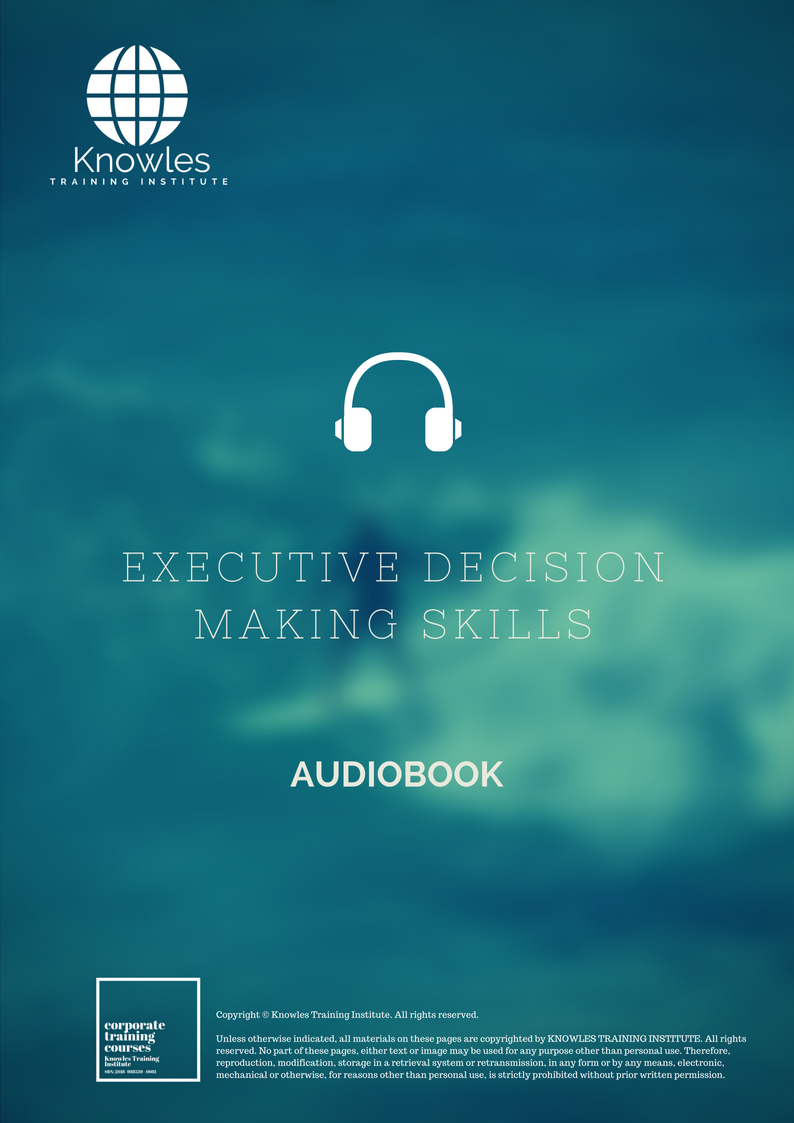
Executive Decision Making Skills Training Infographics Pack
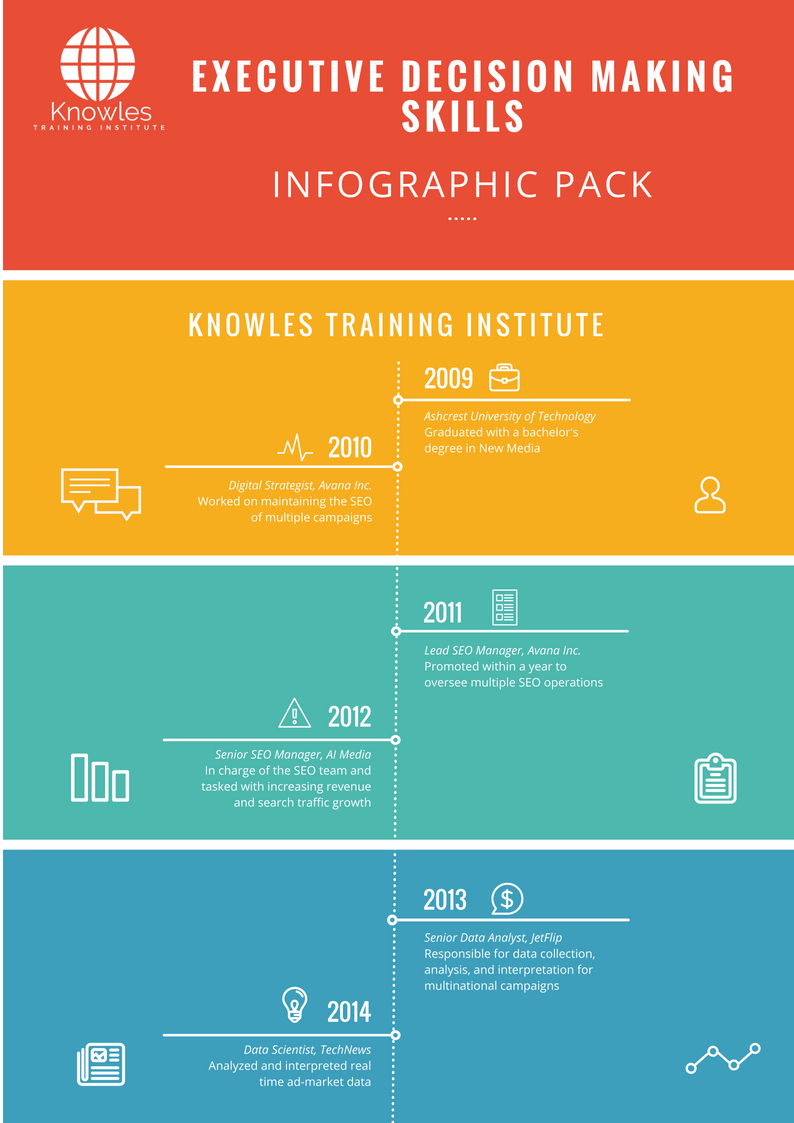
Executive Decision Making Skills Certification
Each course participant will receive a certification of training completion

Course Fees
There are 3 pricing options available for this Executive Decision Making Skills training course. Course participants not in Singapore may choose to sign up for our online Executive Decision Making Skills training course.
SGD 1,334.96 For a 60-minute Lunch Talk Session.
SGD 584.96 For Half Day Course Per Participant.
SGD 884.96 For 1 Day Course Per Participant.
SGD 1,184.96 For 2 Day Course Per Participant.
Discounts available for more than 2 participants.
Course Discounts, Fundings & Subsidies
We have the following discounts, fundings & subsidies for this Executive Decision Making Skills training course

Upcoming Executive Decision Making Skills Training Course Schedule
Contact us for the latest Executive Decision Making Skills course schedules:
Phone: +65 6714 6663
Email: contact@knowlesti.com
Message:
Download Executive Decision Making Skills Course Brochure
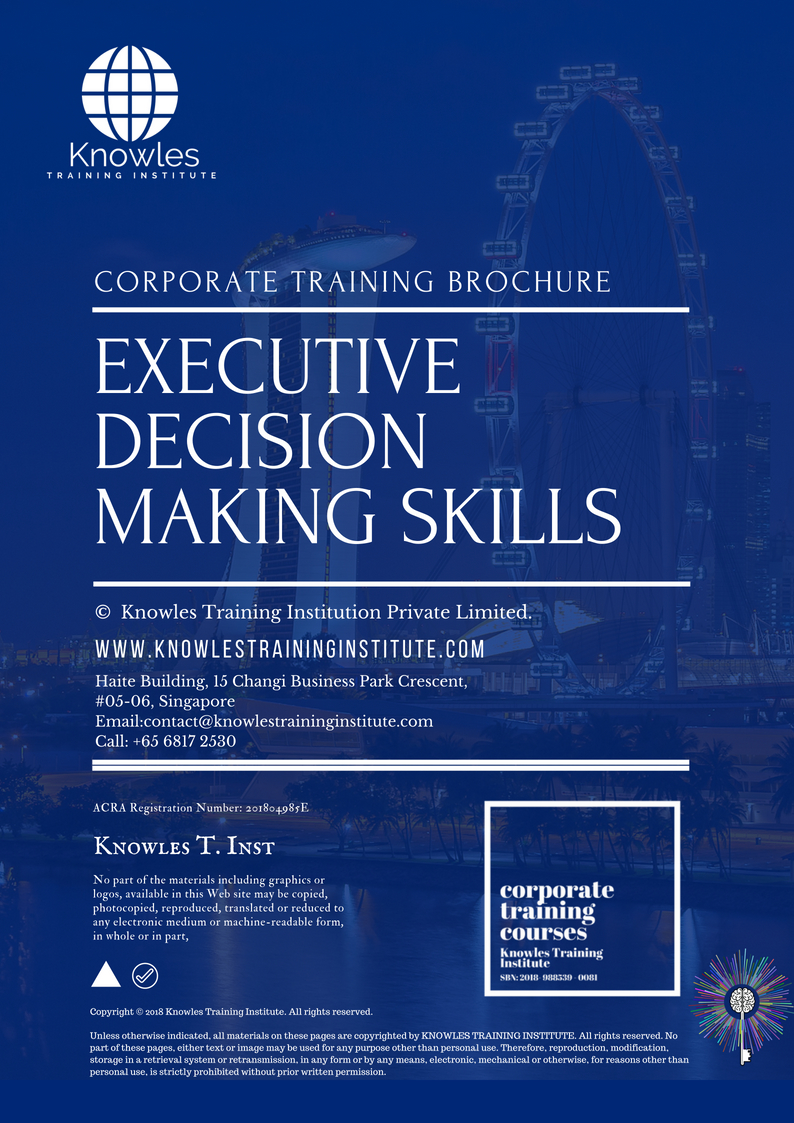
Request for this Executive Decision Making Skills course brochure. Fill up the short information below and we will send it to you right away!
Post-Training Support: A vast majority of training does not have any effect beyond 120 days. But to work, training has to have a strong pre- and post-training component. Post-training reinforcement consequently helps individuals to recall the understanding and ask questions.
Blended Learning: Learning does not occur in the classroom. Virtually everybody prefers distinct ways of learning. Successful learning should have a multi-channel, multi-modal strategy.
We Understand The Industry: Similarly, we’ve got a profound comprehension of the business, business design, challenges, strategy and the that our participants are in and have designed the courseware to cater to their professional needs.
Course Content: Knowles Training Institute’s material is relevant, of high quality and provide specific learning outputs. As a result, Participants will leave the training course feeling as they have gained a strong understanding and will also be in a position to execute what they have learned sensibly.
Course Development — The workshop modules follow a systematic and logical arrangement. Therefore, this structure helps to ensure that the course material allows the facilitators to deliver the course in a logical arrangement. Consider the subjects as building bricks into learning, our facilitators slowly build towards a comprehensive picture of this entire topic.
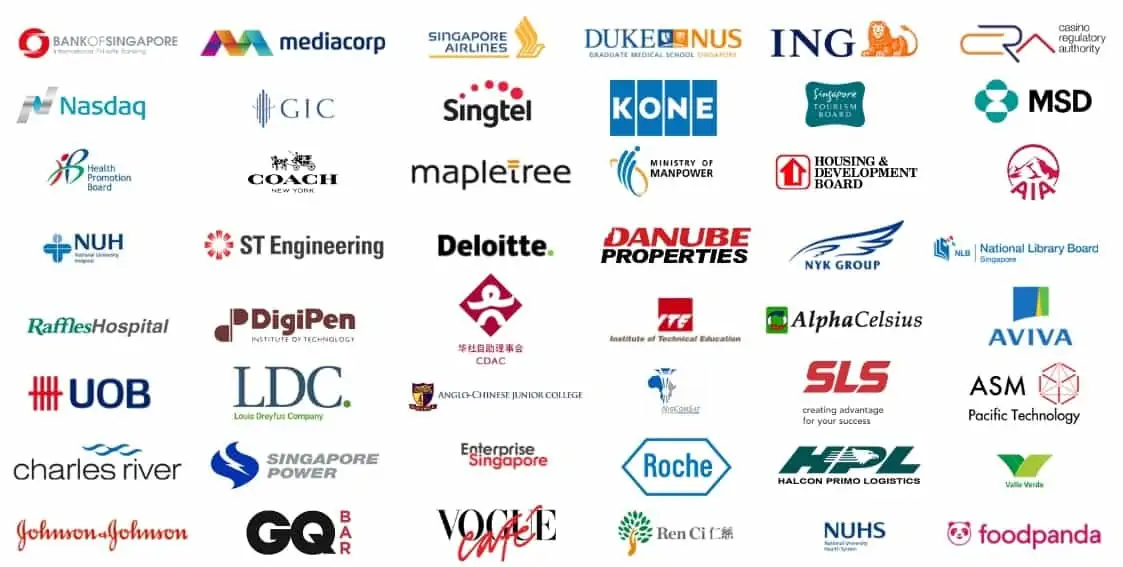

Course Enquiries

Fill up the form and we will get back to you in less than 1 working day.
Alternatively, give us a call to have one of our training consultants contact you. Our corporate training courses can be contextualized to meet your organization’s training needs. Leverage on our large pool of professional trainers and consultants for your organization’s training needs.
Office Address: 60 Paya Lebar Rd, #07-54 Paya Lebar Square, Singapore 409051
Office Phone: +65 6714 6663
Email: contact@knowlesti.sg
We Guarantee 100% Privacy. We Respect Your Privacy. Your Information Will Never Be Shared.
Questions
Decision making is the method of making choices by recognizing a decision, collecting information, and assessing alternative choices. Using a step-by-step decision-making method can help you make more conscious, rational decisions by organizing important information and representing alternatives.
At the most eminent level, we have chosen to describe decisions into three major types: consumer, business, and personal decision making.
Managers are regularly called upon to give decisions in order to resolve problems. Decision making and problem-solving are continuous processes of assessing situations or problems, considering alternatives, giving choices, and observing them up with the required actions.
A good decision is one that is made carefully and thoughtfully, considers and includes all important factors, is constant with the individual’s knowledge and values, and can be explained simply to others.
A good decision is one that is made carefully and thoughtfully, considers and includes all important factors, is constant with the individual’s knowledge and values, and can be explained simply to others.
Decision making is similar to planning, organizing, directing, and controlling roles of a manager. Decision making is essential to accomplish the organizational goals within given time and resources. Decision-making is a pervasive function of managers intended to achieve organizational goals.
Characteristics of Decision Making
- Mental and Intellectual Process.
- It is a Process.
- It is an Indicator of Commitment.
- It is a Best Selected Alternative.
- Decision-Making Might be Positive or Negative.
- It is the Last Process.
- Decision Making is a Pervasive Function.
- Continuous and Dynamic Process.
Various Techniques of Decision Making
- Group Discussions.
- Brainstorming.
- Delphi technique.
- Marginal Analysis.
- Cost-Benefit Analysis.
- Ratio Analysis.
- Financial Analysis.
- Break-even Analysis.
Decision making is similar to planning, organizing, directing, and controlling roles of a manager. Decision making is essential to accomplish the organizational goals within given time and resources. Decision-making is a pervasive function of managers intended to achieve organizational goals.
Individual Decision-Making
- Cost-Benefit Analysis. Before reaching a decision, it’s crucial to weigh the pros and cons to guarantee that you’re making the most suitable decision.
- Narrow Your Options.
- Evaluate the Significance.
- Don’t Sweat the Small Stuff.
- Do Your Research.
- Get a Well-Informed Opinion.
Decision-making is a cognitive method that helps you chart out the results of your actions. It allows you to reach the most suitable course of action that will help you accomplish your goals and objectives — ultimately forming your destiny. In other words, it’s in the times of decision that you determine your fate.
While there are dozens of decision-making methods at your disposal, the more popular ones includes, market research, cost-benefit analysis, SWOT analysis and feasibility studies.
Decision-making is the act of picking between two or more paths of action. In the broader process of problem-solving, decision-making involves choosing between workable solutions to a predicament. Decisions can be made by either an intuitive or reasoned process, or a mixture of the two.
Effective decision making is represented as the method through which alternatives are chosen and then managed through implementation to accomplish business objectives. ‘Effective decisions result from a systematic method, with clearly defined elements, that is handled in a distinct sequence of steps’
Advantages of Decision Making
- Gives more information.
- Increase people’s participation.
- Provide more alternatives.
- Improves the degree of acceptance and commitment.
- Improves the quality of decisions.
- Helps in strengthening the organisation.
- Costly.
- Time-consuming.
Decision making is the mental method that leads to the adoption of action among several choices. Every decision-making process provides a final selection. The output can be an action or an opinion.
Decision making is similar to planning, organizing, directing, and controlling roles of a manager. Decision making is essential to accomplish the organizational goals within given time and resources. Decision-making is a pervasive function of managers intended to achieve organizational goals.


